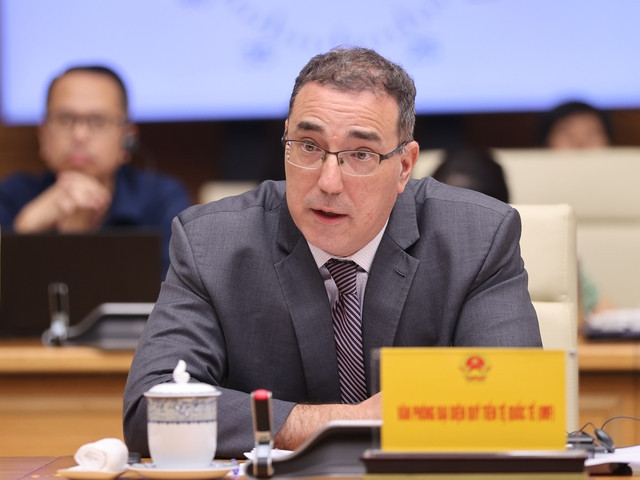
At a conference held early this week, Vietnamese and foreign experts recognized Vietnam’s great efforts in socio-economic recovery and development.
Vice Rector of the National Economics University Hoang Van Cuong said the spectacular achievements in economic development are the results of efforts in management and consistency in stabilizing macroeconomics and the implementation of many flexible policies. Vietnam has overcome pressure on inflation. From now to the year-end, pressure on inflation won’t be as much as seen in the previous period.
The success in controlling input costs, plus the effective monetary policy management, will help keep inflation at a low rate.
However, he warned that the highest risk for Vietnam’s economy in the last months of the year and next year is a world recession, leading to slow economic growth.
World Bank Vietnam’s chief economist Andrea Coppola said that Vietnam’s economy has recovered very quickly and impressively. “I think Vietnam’s economic growth rates in Q2 and Q3 were very good. Industry has witnessed tremendous growth. But if we look into the future, we still can see basic challenges,” he said.
The impact from the world’s economic growth slowdown is one of the challenges. He said Vietnam should effectively use economic recovery support packages.
Tran Du Lich, a member of the National Advisory Council for Monetary Policy, stressed that it is the time for Vietnam to prepare development scenarios for next year. Vietnam’s economy is now in dire need of capital, but what is more urgent is the absorption of capital. Therefore, there must be harmonious coordination between monetary and fiscal policies.
Chief Representative of the International Monetary Fund (IMF) Vietnam Francois Painchaud said that Vietnam is recovering well, especially after removing barriers related to Covid-19. The great efforts in increasing vaccination coverage and implementing socio-economic recovery and development programs have created a momentum for recovery, including tourism.
However, Vietnam needs to be very cautious in regulating the monetary policy. The exchange rate in Vietnam is lower than in other countries. The State Bank of Vietnam (SBV) is making efforts to stabilize the exchange rate to support domestic production.
Meanwhile, fiscal policy needs to give stronger support, targeting specific goals and applying them on a large scale so as not to go against monetary policy.
Truong Van Phuoc, former chair of the National Financial Supervisory Board, said it is highly possible that the US FED would continue to raise the interest rate on September 21. “Vietnam needs to be consistent in stabilizing the exchange rate. The Vietnam dong must not depreciate,” he said.
Expert Le Xuan Nghia said Vietnam has to be cautious with the exchange rate. It is necessary to think about whether the SBV should raise the interest rate. And if the answer is ‘no’, this means that forex reserves would have to be sold to keep the exchange rate stable. Nghia cited several issues that need attention, including the corporate bond market. It is estimated that about VND70 trillion worth of bonds will mature by the end of the year, while the figure will be VND140 trillion the next year.
Tran Dinh Thien, former director of the Vietnam Economics Institute, emphasized the exhaustion of enterprises and the weak cash flow to serve production, which means that worrying problems still exist. It would be better to increase public investment, which means ‘pumping blood’ into the economy.
If the pump is implemented slowly, the economy will be thirsty for capital, and the burden will be on commercial banks and the financial market, he said.
Thu Hang